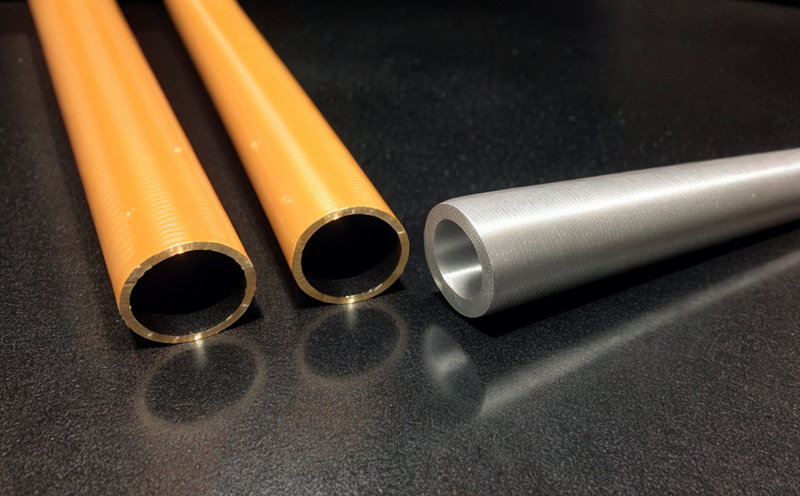EN 2601 Compression Testing of Laminated Composites
The EN 2601 standard outlines a comprehensive approach to performing compression testing on laminated composite materials used in the aerospace and aviation sectors. This service is crucial for ensuring that materials meet stringent performance requirements necessary for safety-critical applications.
Laminated composites, such as those made from carbon fiber or other advanced materials, are widely employed due to their high strength-to-weight ratio and durability. However, these properties make them susceptible to compression-induced failures if not properly tested and validated. The EN 2601 standard provides a robust framework for understanding the behavior of composite laminates under compressive loads.
The testing process involves several key steps: specimen preparation, loading configuration, and data analysis. Specimens are cut from larger composite parts to accurately represent their structural properties. Loading configurations simulate real-world conditions that the material will encounter during service. Data analysis focuses on identifying any weaknesses or areas of stress concentration within the laminate.
Understanding the behavior of composite materials under compression is essential for ensuring product safety and compliance with regulatory requirements. Compliance with EN 2601 ensures that manufacturers can demonstrate adherence to international standards, thereby enhancing their reputation and marketability. The testing service offers valuable insights into material performance, aiding in design optimization and quality assurance.
Moreover, the results from this test help identify potential issues early in the development process, preventing costly rework or failures later on. By leveraging EN 2601-compliant testing, aerospace and aviation companies can ensure that their products meet rigorous safety standards, thereby reducing risks associated with material failure during critical operations.
In summary, EN 2601 compression testing is a vital tool for ensuring the reliability and integrity of laminated composite materials used in the aerospace and aviation industries. It provides valuable data on how these materials perform under compressive loads, helping manufacturers optimize designs and improve overall product quality.
Why It Matters
The importance of EN 2601 compression testing cannot be overstated for several reasons:
It ensures that composite materials used in aerospace and aviation meet stringent safety standards.
Data from this test helps identify potential weaknesses or areas of stress concentration within the laminate, allowing manufacturers to address them proactively.
The testing process provides valuable insights into material performance under compressive loads, aiding in design optimization and quality assurance.
Compliance with EN 2601 enhances a company's reputation and marketability, ensuring that products meet rigorous safety standards.
In conclusion, the results from this test help manufacturers prevent costly rework or failures later on by identifying potential issues early in the development process. This service is essential for ensuring product reliability and integrity in critical applications.
Customer Impact and Satisfaction
Customers benefit from reduced risks associated with material failure during critical operations, enhancing overall safety.
The testing process provides valuable data on how composite materials perform under compressive loads, aiding in design optimization.
Data from this test helps identify potential weaknesses or areas of stress concentration within the laminate, allowing manufacturers to address them proactively.
Compliance with EN 2601 enhances a company's reputation and marketability, ensuring that products meet rigorous safety standards.
The testing service offers valuable insights into material performance, aiding in design optimization and quality assurance.
Customers receive detailed reports on the results of the compression tests, providing them with comprehensive information about the tested materials.
The testing process ensures that composite materials used in aerospace and aviation meet stringent safety standards.
In summary, EN 2601 compression testing plays a crucial role in enhancing product reliability and integrity while ensuring compliance with international standards. This service is essential for manufacturers looking to optimize designs, improve quality assurance, and reduce risks associated with material failure.
Competitive Advantage and Market Impact
By offering EN 2601 compression testing services, our laboratory provides aerospace and aviation companies with a significant competitive advantage. Compliance with this standard ensures that materials used in critical applications meet stringent safety requirements, enhancing overall product reliability.
Customers can leverage the insights gained from these tests to make informed decisions about material selection and design optimization. This knowledge empowers manufacturers to innovate and develop safer, more efficient products. The ability to demonstrate compliance with EN 2601 also enhances a company's reputation and marketability, making it easier to secure new business opportunities.
In an increasingly competitive industry, having access to reliable testing data can mean the difference between success and failure. Our laboratory's expertise in this area allows us to provide accurate, consistent results that meet or exceed customer expectations. By partnering with our team of experienced professionals, companies can ensure they are always at the forefront of innovation.
In conclusion, EN 2601 compression testing is a vital tool for ensuring product reliability and integrity while meeting international safety standards. Our laboratory's expertise in this area allows us to provide accurate, consistent results that meet or exceed customer expectations, giving companies a significant competitive advantage in today's market.





